Matt Seinberg
Rich Knight
Introduction
Streeter Click
“Matt Seinberg has always been a pain in the butt,” says Allen Beebe, of WMJY-FM, in Biloxi, Mississippi, “but thank gawd for him.”
“Air checks aren’t a business, for Matt,” says Gnarly Charlie, of WFLC-FM, in Fort Lauderdale, Florida. “Air checks are his passion.”
There’s a practical side to his passion, says Beebe. “In Hurricane Katrina, I lost all the air checks I made during my 30-year career. Matt sent me copies, of my work, that he collected.”
“Matt’s dedicated to performing the essential, often thankless, task, of preserving radio, for generations to come,” says radio legend, Dick Summer. “If it weren’t for Matt Seinberg, the next generation wouldn’t have a clue about how radio excited the last.
“Radio has changed, so much, in the last decade,” says Summer, “that those, of us, members of the 'Louie-Louie Generation,' wouldn't recognize it, if we still listened. That's okay. Change is how an 'art form' survives, and "radio as art."
“Radio, today, wouldn’t nab my interest, as it did, all those years ago. I wouldn’t consider devoting a career to it, today. The creative autonomy, I enjoyed, is impossible, for now.
“Rummaging through the dust in the back of my closest,” says Dick Summer, “I came across a pile of air checks. These ‘tapes’ go back to the 1960s and 1970s. The stations include WBZ-AM, Boston; WNBC-AM, WNEW-FM and WYNY-FM, all in New York City.
“My granddaughters, Cassie and Jacqui, were visiting. As both are taking media classes, in college, I played the air checks for them. They were surprised. They heard nothing like those shows, on radio, today, and their teachers mentioned nothing of such entertainment.
“These air checks are a small, but important, part of history and radio history, in particular. These air checks are oral history. All air checks are a vital part of who we are and were, and how we got here.
“There are books called, 'The History of Radio.' Printed words can’t capture radio, which is about sounds that excite the mind and body. The sounds are different, now, less exciting, perhaps, than during the days and nights, of the Louie-Louie Generation.
“I'm not knocking radio. It’s as different, today, as radio, of the 1950s and 1960s, was from soap opera radio, of the 1940s. Times change, so do art forms.
“Radio hiccups and new formats appear. Some listeners like what they hear, others don’t. Everyone calls it progress, but the inflection, on “progress,” varies.
“You can readily buy copies, of soap opera radio, now called, Old-Time Radio. What’s hard to find," says Summer, "in quality or quantity, is radio from the Louie-Louie Generation. Big Apple Air Checks is one of the few places, other than the dusty piles in my closest, where you can find Louie-Louie Generation radio, aplenty.”
You can’t realize the future until you recognize the past. Radio, today, is bland, barren and boring because any sense of what was and what may be has vanished. Matt Seinberg has a great ear for an era of exciting, creative radio, as you will read.
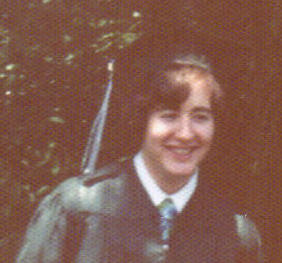
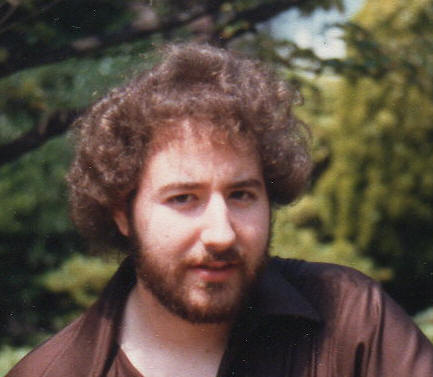
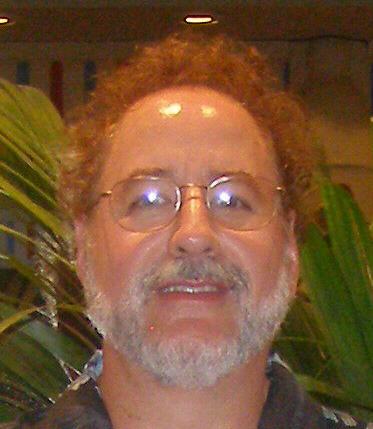
Matt in 1976, 1980 and 2008
Grub Street (GS) The beginning is a good place to start. What’s an air check?
Matt Seinberg (MS) An air check, for a disc jockey (DJ), allows her or him to monitor their on-air work. In retail, we might use sales volume to judge efficiency. Schools use grades, for the same end. In radio, air checks are important.
GS Is it as simple as it seems.
MS Sure, a DJ hits a button to record his or her show. Listening to the recording is the best way to improve on-air work. When a DJ applies for a job, a brief air check goes along, with the resume.
GS Does an air check include the music, commercial spots and other content?
MS Yes, some do, but most don’t. You edit out or scope the music and any other content the DJ didn’t voice or produce. A scoped air check, of a full hour, of on-air work, might be five minutes long.
GS True, we have an unscoped air check of Roscoe, from WNEW-FM, about 1969, which, when scoped, is about 5 minutes including a sixty-second commercial.
MS There’s a difference between an air check recorded at a radio station versus on recorded by a hobbyist. An air check, recorded in the studio, during a DJ shift, automatically scopes; microphone on, record; microphone off, stop recording. The air check starts and stops when the microphone turns on.
When a hobbyist records an air check, we just let the tape or digital audio recording program on our computer run for a minimum of 80 minutes, with a maximum usually being 5 hours, depending on the show we are recording. We keep everything, including the DJ talk, commercials, imaging and music.
GS Let’s see, typically, a DJ used a work-related air check, which is scoped or pared down to his or her on-air work. A hobbyist is more likely to include music, spots by anyone, the DJ, promotion announcements and so forth.
MS Yes, the point, of a scoped air check, is to focus on what a DJ does, on air. A DJ wants to hear how he or she sounds between songs or doing spots. Someone interested in hiring a DJ, also wants to what she or he does, on air, not the music or content voiced or produced by someone else.
GS Taping DJs, doing their shows, is a passion, for some people.
MS This is the focus Big Apple Air Checks. We help collectors, of air checks, trade or buy and find what they want or need. Collectors, of any item, typically have all the usual items and want nuanced selections, which we provide.
Matt is one of the prominent figures in a small group of passionate radio fans who have worked hard over the years to collect, catalogue and share the treasures of contemporary American broadcasting. These recordings, known to the faithful as "air checks", document not only a form of entertainment for the public, but a subculture and a way of life for those that created the magic moments, saved by the miracle of sound recording. There is no better window to your own history or key to unlock your memories, than an air check of a favourite radio station [or DJ] from your listening past. Matt is a trusted guardian of those keys!
Jay Philpott, Bonneville Radio, St. Louis
GS When Tom Konard ran “Air Check Factory,” he scoped air checks for DJs applying for job. Do you provide this service, as well?
MS Yes, Big Apple Air Checks offers this service, but we’re more for the passionate air check collector, at least right now. I intend to widen our scope, in the near future.
GS What do you think is the main purpose of Big Apple Air Checks?
MS History! The web site is not a history lesson. It’s not a textbook. It’s a listing of my air check collection. It’s my history of radio, mostly based on what I like or believe is or was good radio. Big Apple Air Checks is a history of radio, from the late 1960s through today.
GS Am I correct, only some of the air checks, which you talk about, are playable on Big Apple Air Checks.
MS Right, we don’t stream or allow you to load air checks, for listening. Each page has a clip that will greet you as open it, but that’s about it. Big Apple Air Checks is a listing site, nothing more.
The list is thirty years long, though. Other sites offer streaming air checks. Big Apple Air Checks is more for serious collections.
My only exceptions are the tributes, on the “In Memoriam” page, which stream.
GS We’ll get back to your tributes, in a moment. Big Apple Air Checks, how did you decide on the name?
MS My inspiration, for name the web site, was the late Tim Benko, from Chicago. He nicknamed his air check collection, Windy City Air Checks. I thought it was a great name. For Benko, it was simple. The Windy City is a nickname for Chicago.
Why not name my web site after New York City, the Big Apple. Benko thought I was a copycat. Someone might name a web site, focusing on Boston air checks, Bean Town Air Checks. The nickname, Big Apple or Windy City, for that matter, was popular before the web site launched. Benko did not recognize the homage.
GS What do you hope visitors, to your web site, will take away?
MS I hope they understand radio was entertaining, not that long ago. I grew up, with radio that was entertaining. It was exciting, not only the music, the DJs mostly. Nothing compared to WABC-AM, then or now. What once was can be, again, if not exactly the same way, with the same effect.
Of all the people I've met over the years, Matt has to be one of the most passionate fans of radio I know. He has a genuine desire to collect and preserve these radio recordings without any thought of trying to make money out of it. I know firsthand how time consuming such a project is, and how difficult it must be for him to balance his love for radio with his love and time with his family.
I must tell you that Matt has been most generous, donating hundreds of air checks to my website over the years while asking very little in return. Were it not for Matt, Airchexx.com likely never would have become the popular website it is, since it was he who found the site in its infancy and generously donated many boxes of classic recordings that I never otherwise would have had at a time when the site was just launching. There are few people I know who have the passion and dedication that Matt has, and we few in the radio history business certainly owe him a debt of gratitude for preserving these recordings.
Steve West, Airchexx.com
GS Where do you think Big Apple Air Checks is heading.
MS Big Apple Air Checks has been and will continue to be my passion site. I update the site at least once a month. We also offer editing and air check development, for DJs who don’t have access to equipment. As well, we can transfer any medium, say, cassettes, to digital, including most size reel-to-reel, and back again.
GS The array of Big Apple Air Check Profiles shows, well, what you can do. How did the Tributes start?
MS When Bruce Herbert passed away, in 2004, I wanted to do a Big Apple Air Check Profile. Herbert had worked WGSM-AM, in Huntington, NY, and WCTO-FM, in Easton, PA, but there was scant information about him, his work or career. I knew his stepdaughter, Amy, and asked her about air checks or whatnot.
Amy found a pile of tapes and other material. I had the basis for a solid profile, of Herbert. Jim Ferguson, who worked with Herbert, voiced the introduction to the profile.
I am proud, of the Bruce Herbert profile. Much came from little, in that one. Amy said, “Every time I try to listen to the profile, I can’t. I cry.”
GS Big Apple Air Checks paid homage two super jocks that passed away in 2008.
MS Yes, Jackson Armstrong and Ron O’Brien, passed away long before their stale dates. I never met Armstrong, but talked, with him, on the phone several times. When he passed away, I created a two-part air check profile of him.
The success of a Tribute relies on the kindness of others, often strangers. For Armstrong, his daughter, Devon Fischer, was unusually generous. Dee Brockwell, of WMQX-FM, “Oldies 93.1,” in Greensboro, North Carolina, spoke, with much warmth and passion, about Armstrong. It was hard not to cry.
Born John Charles Larsh, he worked mostly as “Big John” Armstrong, Jackson Armstrong and Jack Armstrong. He died after a fall down a staircase, in his home. Armstrong was 62.
GS O’Brien, a legend, at 21, was only 56 when he passed away.
MS “Big” Ron O’Brien was a shock for me. He passed away about a month after Armstrong. I knew OBrien, listened to him, as I could; he changed stations, often. I talked with O’Brien, on the phone, many times, but once met him, in person.
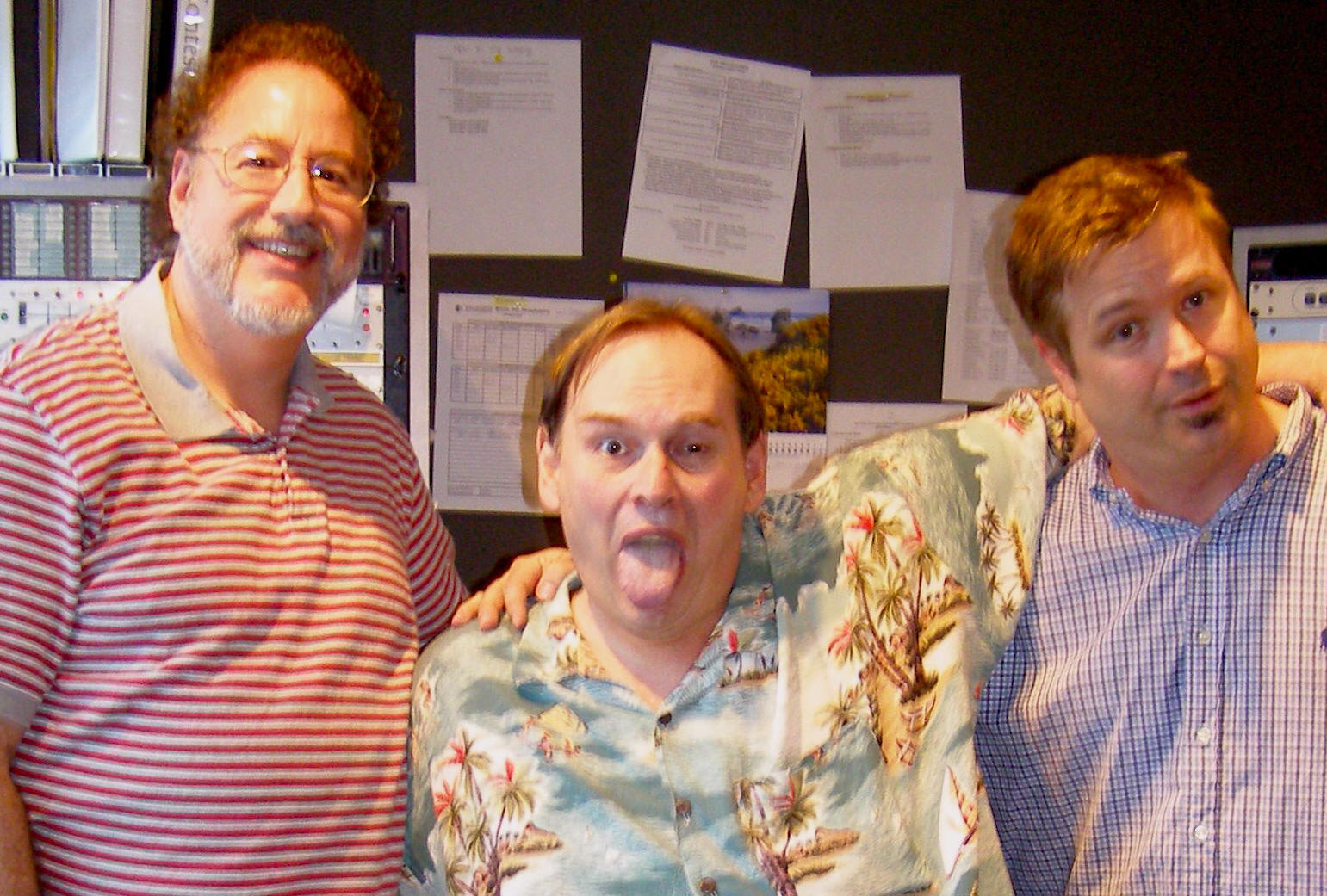
Matt, "Big" Ron O'Brien and "Cadillac Jack"
In 2007, my wife and I had lunch, with O’Brien, who had returned to Philadelphia, to work WOGL-FM. I had plans to have lunch with O’Brien. I mentioned the lunch to JR Russ. JR asked if he could join us. He said that he knew Ron, but hadn’t seen him in awhile. I said sure, but let’s make it a surprise. He agreed, and we arranged to meet in the lobby of the WOGL-FM building. JR arrived just before O’Brien, who was surprised and happy to see JR. He was also happy we finally met, in person.
When I worked XM Satellite Radio, in Washington, DC, I helped Terry Young prepare his "Sonic Sound Salutes," audio tributes to the late, great AM stations of the 60s. Matt was one of the go-to sources for great sound. Whether it was WABC-AM, WCFL-AM or KHJ-AM, Matt had it or could connect me to who did. His contribution to reviving the exciting sound of these great stations, if even for a few hours, is immeasurable.
I had the extreme pleasure to join Matt and Big Ron O'Brien, whom I had known for a while, at lunch in 2007. Sadly, it was the last time I was with "Big Ron." Matt was instrumental in preserving the on-air work of O'Brien to inspire generations.
Matt is a true radio knucklehead.
JR Russ, consultant
“Big” wasn’t only a nickname for Ron O’Brien, he was huge, physically, and in personality. In February 2008, pneumonia developed from a weak cough. He spent two months, in hospital, before passing.
GS You speak, with such passion, about radio and DJs. When did your interest in radio start?
MS I loved listening to radio, always. When I was young, there was nothing like it, for me. Every kid thinks the DJ is talking to her or him and no one else: this is part of the magic, of radio.
A good DJ makes each listener feel he or she is the only one. Unfortunately, few DJs, today, create such a strong sense, of attachment. This is a shame. When I was growing up, the WABC-AM DJs made me believe they were talking only to me.
GS Maybe the lack of job security and low pay distract DJs, today.
MS That’s so true. About 1976, near the end of high school, I noticed radio. I’d listened, to radio, all the time, but paid little attention. Before my late teens, radio was wallpaper: always heard and rarely noticed.
GS Once in, the hook went deep. What caused you to notice radio?
MS Well, it wasn’t so much listening to radio as it was a special radio station. One day, in a sense, I discovered WNYT, a college radio station. Channel Q, once available from Cablevision, carried WNYT. This is not an over-the-air station, but a “carrier current.”
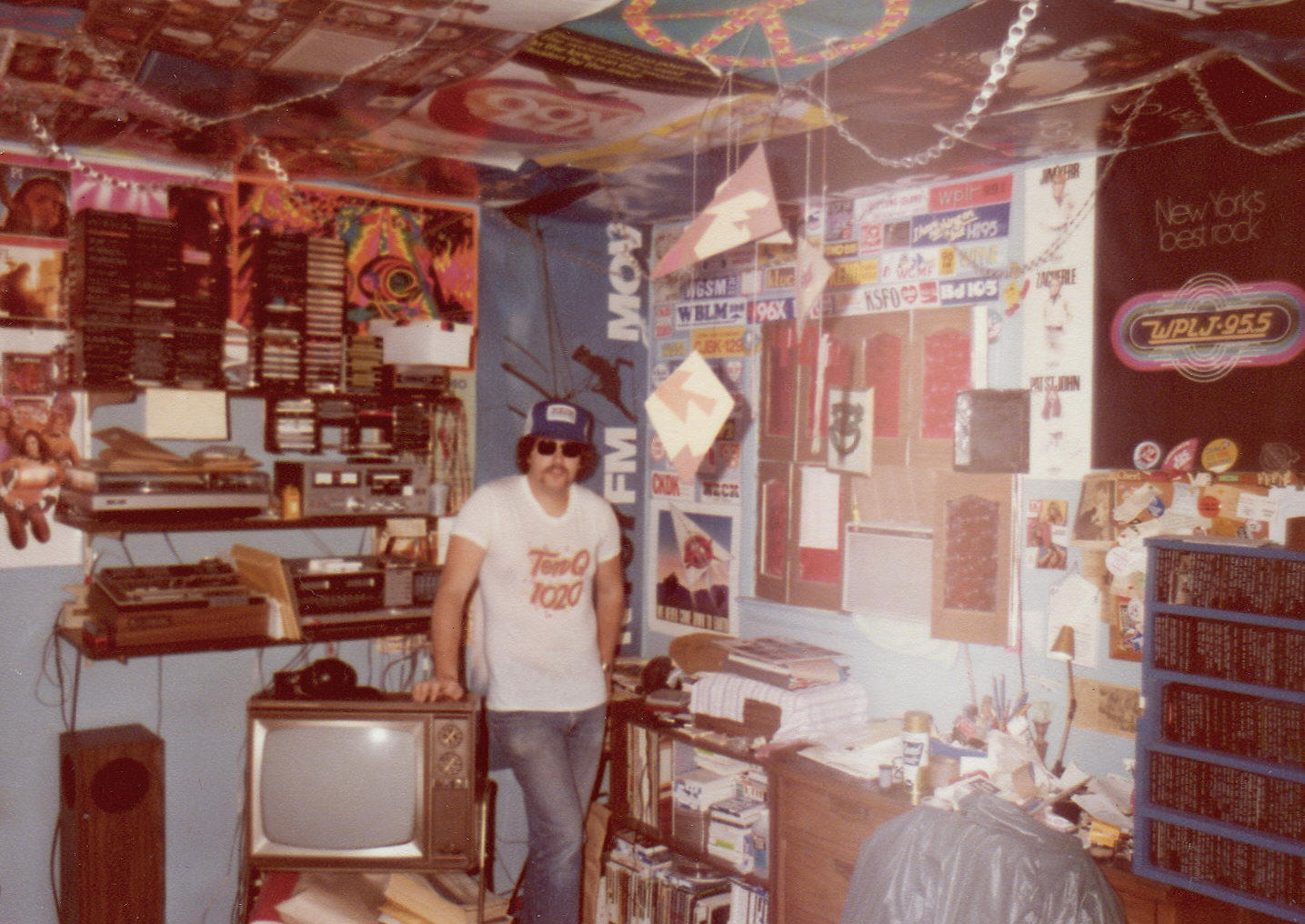
Matt in "The Radio Room," late 1970s
I was at the home of a friend, when we discovered WNYT. We’re listening to the station. At once and together, we say, “Wow, what is this?”
GS Reminds of one day there are women, where none seemed to exist before. Tell me more about this carrier station.
MS WNYT is a college station. It belongs to the New York Institute of Technology, in Old Westbury. WNYT is a carrier station, in the sense it was only available on the Q Channel. Still, the service had a sizeable audience.
In my last year or high school, I began listening to the DJs, on WNYT. I called the hit line. I talked to Greg Monti and Dave Allen, two DJs on WNYT. We’re all friends to this day.
Eventually, I visited the station. This wasn’t my first time in a radio station. It was the best time, though. WNYT was the greatest. Every inch of it interested me. WNYT was inviting.
GS Seems this had a huge effect on you.
MS Yes, suddenly, I wanted to work college radio. I’d do whatever it took to get on-air, at WNYT. College radio, I thought, would fast track me into major market radio, which was also a new idea for me.
I enrolled at the New York Institute of Technology (NYIT). I considered attending state colleges, perhaps, in Brockport or Genesco. In the end, I decided on NYIT as it had the best radio station, WNYT.
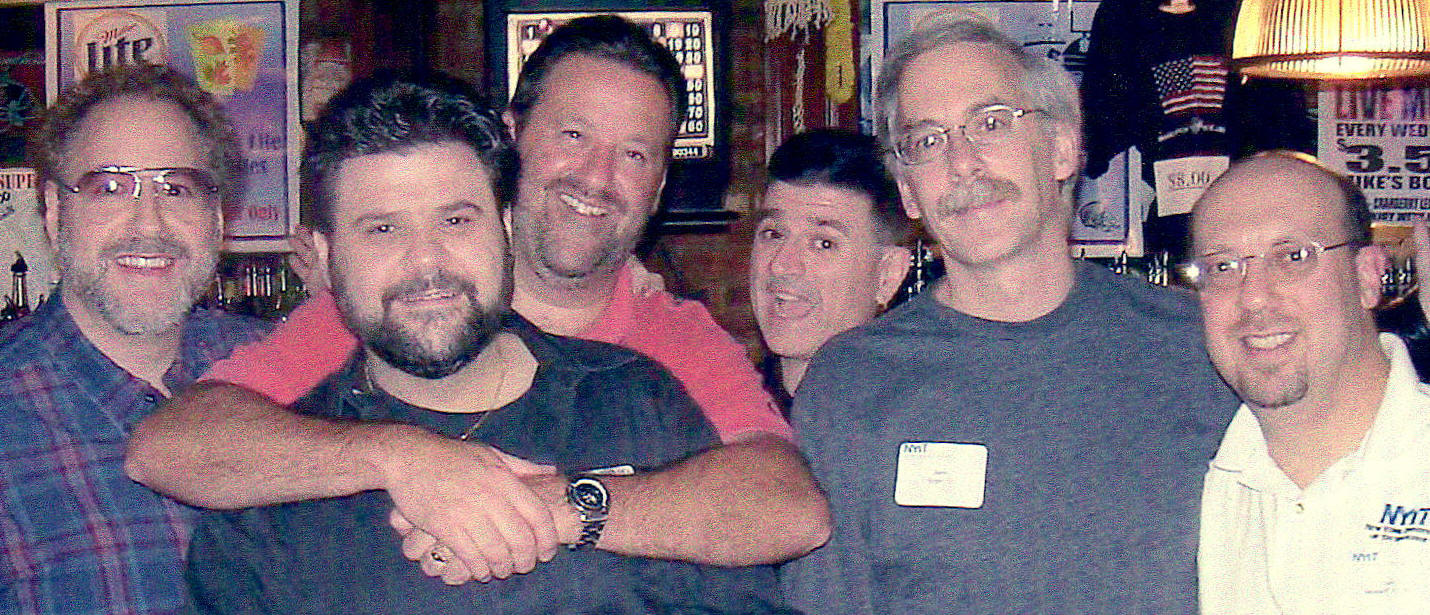
WNYT Reunion, March 2005,
from left: Matt, Bob Alfano, Gary Tietjen,
Dennis Falcone, Steve singer and Jeff Morosoff
As well, I slide into WNYT faster than I might have anywhere else. I knew people at the station. I knew the on-air workings, inside and out. WNYT was a glove for my hand.
During the week, WNYT used an adult or progressive format (AOR), based on the WNEW-FM and WLIR-FM, Garden City, New Jersey, format. Weekends it was Top 40. Working different formats, if in a college station, was a great experience and fun.
I did mostly Top 40, with some fill on the AOR side. One summer, a friend found it difficult to make his show. I filled-in for him, often; the experience was great.
GS What was your first job, in radio, after college?
MS That was at WWHB-FM, in Hampton Bay, New York. I can’t forget that job, and not only because it was my first radio job. I had flashbacks, nightmares, for years, afterwards.
In 1981, a friend, from college, Dennis Falcone, was working on WRIV-FM, in Riverhead, New York. Dennis tells me he heard about an opening at WWHB-FM. I’m all ears and ready to jock.
Larry Miller, the PD, of WWHB-FM, needed on-air help. I sent him my audition or demo tape. “Demo” because the tape or digital file, today, shows what you can do, on air. Miller calls to say, “I’d like to meet you.”
Great, I thought the road to stardom begins on WWHB-FM. I drove east, from Plainview, on Long Island, where I lived, to Hampton Bays. The WWHB-FM studios were on the edge of a ritzy part of Long Island, in the Hamptons, near Sag Harbor, on the way to Montauk. You can smell the money.
I meet Miller. He says, “Let’s go.” We jump in his Jeep, heading out, I thought, to tour the coverage area. The entire interview consisted of us driving randomly around Hampton Bay, smoking pot.
GS Did you get the job?
MS I got the job.
GS You were ready for the glamour of radio.
MS Yeah, the job was important, but hardly glamorous. I filled out the commercial logs, Monday through Friday. Logging commercials, by hand, juggling advertisers and keeping competitors a fair distance apart is tricky. Thank gawd computers do it, today. Gawd bless those who could do it by hand, and not lose their minds.
Weekends, I was on air.
GS Seven days a week is much work.
MS I figured it this way. Miller worked New York City, the top radio market in the USA. He was PD WKTU-FM and WQIV-FM. He worked alongside the best. Many of the best worked for him. I smugly thought, “I’m going to learn something, at WWHB-FM.”
Was I surprised? Miller didn’t help me learn anything. I learned nothing because of Miller, not anything. He gave me a job, yes, but afterwards, I was on my own.
It was disappointing. I was starting out. I was wondering what I was going to do. I never logged a spot. Where should I start? It was difficult, to say the least.
GS How did WWHB-FM work out for you?
MS I did the best I could. What did I know? I stumbled through the on and off-air work.
Miller offered no direction, but didn’t think my effort good enough. I liked the job. I liked living in Hampton Bays. The station was in a shopping centre, a strip mall, on Montauk Highway.
I saw all the action during the day. At night, Hampton Bays is empty. It was and is the same as any tourist town.
The kicker came on my second day in the job. Two events happened at once. Looking back, I don’t know how I got through.
First, I screwed up the log. I forgot to put in some spots, that is, commercials. “Insert the spots,” someone barked, “right away.”
Second, the overnight jock hurt his back and took health leave. Miller says, “You’re doing overnights, too.” Yes, I want on-air, but not working 19 hours a day.
I’m working a hectic 9-to-5. I leave the station only to come back for 11 pm. This made for a long day and night.
GS Could you at least sleep for four or five hours?
MS I’m not a daytime sleeper, never have been, and it was doubly rough. I had a room, in a house, in nearby Riverhead. The room had two or three windows. It was bright, lovely if you’re on vacation. I had no way to darken it, during the day or evening.
A few days into my on-air career, with no sleep, I’m winging overnights, DJing from moment to moment. Thursday, of my second week, I miss the 6 am newscast by a minute or so. Miller comes in and says, “If you miss the newscast, again, play music to fill the time.” I say, “Fine no problem.”
The next day, Friday, it happens again. I miss the newscast by a minute. WWHB-FM news was a feed from the ABC Radio Network. I to time it to the second: a moment late and WWHB-FM joined the newscast in progress.
As I’m about to switch, to the ABC newscast, in progress, Miller bursts in to the studio. He sweeps everything off the counter and says, “I’m tired of this shit. You’re fired,” he says, in full Donald Trump style. “Send me your W-2 and I’ll pay you!”
GS Not a good way to treat employees.
MS He stunned me. I was speechless, to say the least. No one had ever spoken to me this way. There was no reason for him to act as he did.
I didn’t know what to say. I wasn’t going to beg for my job. It was ridiculous.
This happened at 6 am. I left the station. I called my mother. She was still living in Plainview. I said, “I’m coming home.” She said, “What?” I said, “I’m coming home. I’ll see you sometime on Sunday and I’ll tell you the whole story.”
I go back to my room, to get some sleep. Around 10 am, the sun is bright and sleep is impossible. I wander to the beach. I walk past a payphone, go back to it and call the boss from my last job.
My old job was in the main office of Cohen Fashion Optical, in Flushing, a suburb of New York City. I ask if I can have my job back, “The radio job didn’t work out.”
My former boss says, sure. “The guy we hired, to replace you, stinks. We’re firing him. Yes, we want you back.”
GS What luck you had.
MS That’s for sure, but I’m kicking myself all the way back to Plainview for not asking for more money. When I get back home, my mother tells me, “You’ve got six months,” six months to go back out on my own; that six months lasted two years. Anyway, that was my two-week radio job at WWHB-FM, in Hampton Bays, under a crazy and maniacal Larry Miller.
GS Started poorly and went downhill. Were your parents in radio or a related area?
MS My father was an optician. My grandfather was an optometrist. My sister is in the business.
GS Why aren’t you an optician or optometrist?
MS I had an interest in the business, but not the hands. I could sell glasses. I can sell anything.
I couldn’t make or adjust glasses, to save my life. I was all thumbs. My younger sister, Elyse, an optometrist, in Chicago, carries on the family tradition.
I decided, “Ok, that’s life. Now, what am I gonna do?” A job in retail was natural, and easy. I hoped, one day, for a job in radio.
GS Why not go into radio sales.
MS Great question and the easy answer is I never liked doing cold calls, in person or on the phone. Selling radio time is mostly about cold calls. I’m not a cold call seller, someone walks into a retail store, he or she has, at least, partially decided to buy. I help them make up their mind.
I honestly never thought of selling radio time. I don’t see it as a way in to the air or into programming. A DJ typically goes off-air and into sales, same for a programme director (PD).
GS You’re right, few salespeople, in radio, move into any programming. Too often, they leap over programming into the top management.
MS My mother was a homemaker, then an office manager. We had a traditional family, you might say, for the 1960s and 1970s.
GS You mentioned you have radio sisters.
MS Yes, Sue O’Neal, now works for WCBS-FM, was my first radio sister. I met O’Neal when she joined WXLO-FM, “99X,” in New York City. I think that was 1977. She came from WGCL-FM, in Cleveland, where she worked the same line up as Tim Byrd. Around 1990, O’Neil and Byrd are together, on air, again, at WQHT-FM, in New York City.
Matt is not only a dedicated radio guy, but a kind and helpful friend as well. He's always happy to reach into his air check library and send an mp3 whenever I've needed one. This, in turn, has helped me get more radio jobs which means he's had to record more air checks, which means more work for him. Matt, all the best, and thanks for keeping radio in our hearts and on our computers!
Sue O'Neal, WCBS-FM
In those days, it was much easier to get through to DJs, on the phone. DJs, such as O’Neal or Alison Steele, on WNEW-FM, would pick up the phone and talk, with you. O’Neal and I became friends this way.
O’Neal would change stations, as do all DJs, but answer the phone and talk, as she could. A listener, me, for example, could find a favourite DJ and confirm the identity, with a phone call. Today, few DJs answer the studio phone; he or she doesn’t have time or the interest.
JJ Kennedy, at WOR-AM, is another radio sister. Overtime, she worked as Beth Marshall and Mary Ann Rogue, which is her birth name. Years ago, I kept insisting, to Kennedy, another radio sister, Robin Marshall, worked WYNY-FM, as Beth Marshall.
GS Whoa, let’s try that again. JJ Kenned used the on-air name, Beth Marshall. You confused Robin Marshall, with Beth Marshall.
MS Yes, this is all a bit confusing. Eventually, it works out, but you can see the problem: DJs change stations and names too often. I explained the name mess, about Beth Marshall, to Robin Marshall. Of course, she understood the name change mess, but it was funny.
Years ago, at a radio event, an engineer from WINS-AM, New York City, comes up to me to say he knows my brother. "I don't have a brother," I say. He seemed puzzled. "Your brother, Matt." I say, "I have a son Matt," think he may be confused. "No," he insisted, "Matt Seinberg!
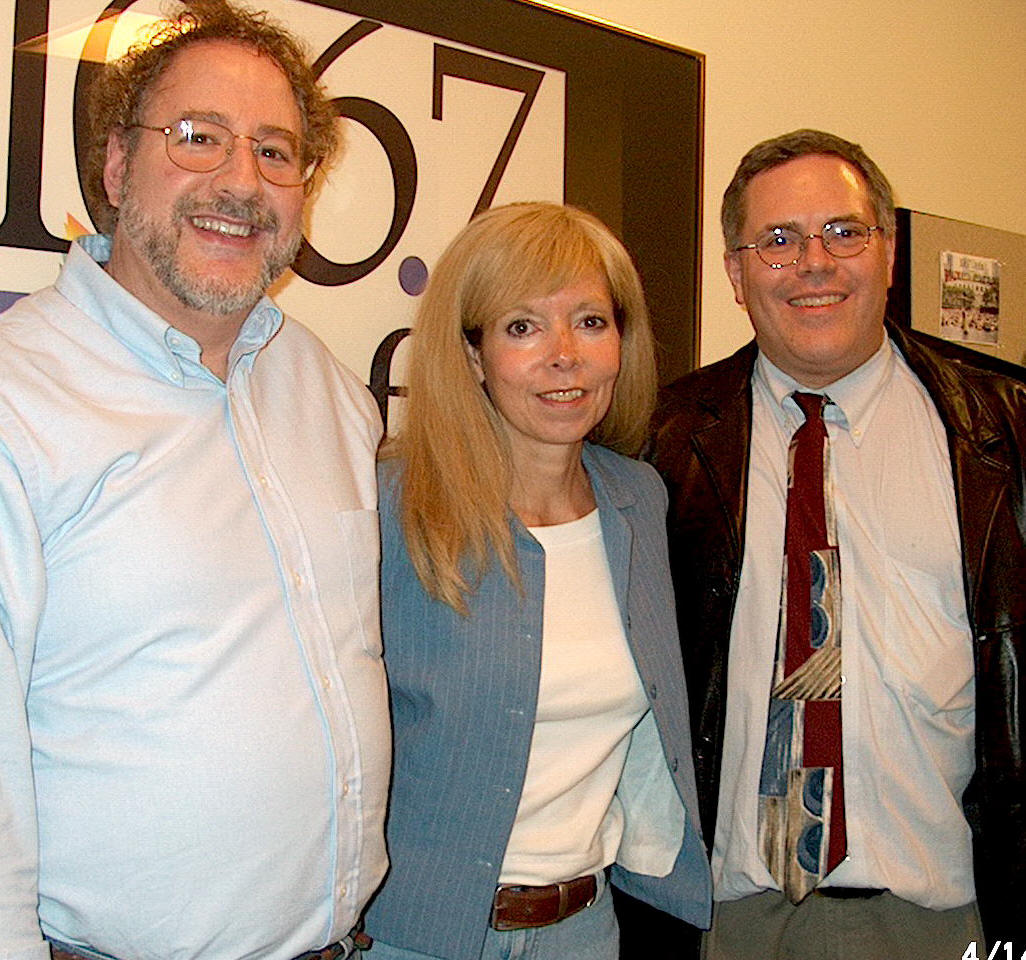
Matt, JJ Kennedy and Greg Monti
Then it hit me. I'd been e-mailing and talking, on the phone, with Matt, but we never met in person. I always joked that we had so much in common he could be my long lost brother. I started referring to him, in our missives, as my brother. I never knew he mentioned that to anyone else.
Time has passed. I've gotten to know Matt better. Now I am convinced I was correct in the first place: he is my brother.
JJ Kennedy, WOR-FM
Today, Robin Marshall works Fresh 102.7, in New York City, and runs “Jayne FM,” a syndicated show aimed at women, 25-54. Currently, it airs on WLTI-FM, in Syracuse, New York; WSTG-FM, in Princeton, WV and WJPT-FM, in Estero, Florida. Robin promotes Jayne as, “who every woman really is, deep inside: sexy, articulate, powerful, intelligent and organized.”
GS I’d say Jayne is every woman since the beginning of time.
MS I don’t know about from the beginning of time, but she certainly represents modern women. The woman who knows what she wants. The woman who knows how to get what she wants. Half, of the Jayne FM audience, are likely married with kids; the other half are single, looking or in relationships.
I admire Matt’s passion for his ‘penniless contribution’ to the radio folks of our world. Especially in times, where most of us will only have memories left! Just looking at the amount of jocks fired in the last year, Matt’s service will allow them to get through a very tumultuous time, by hearing, and laughing at our ‘past selves,’ and being able to share our very own air checks with each other! Love you Matt!!!
Robin Marshall, Jayne FM and Fresh 102.7
Kathy Cunningham is another radio sister. In 1985, Cunningham found an old demo tape I did for WNYG-AM, in Babylon, New York. Malcolm Davis, a PD at WNYG-AM, had asked me, repeatedly, for a tape.
A mutual friend, Charlie Ambrosia, pushed Davis to ask me for a tape. He pushed me to provide one. It’s the way of much radio.
Eventually, I sent Davis a tape. Then we couldn’t connect. He’d miss my call. I missed his call.
GS It was better than a quick call from Miller.
1987, when I was the first female PD and Operations Manager, in the Long Island, New York market, I hired Matt part time for fill in. When I heard him, after the initial air check, talked to him, during the interview, I was impressed. I had an opening in AM drive. I wanted Matt for the position. Please keep in mind, this was and is a 1000 watt day-timer, until I received 24/7 approval, from the FCC. We had limited budget. It was a real classic mom and pop station!
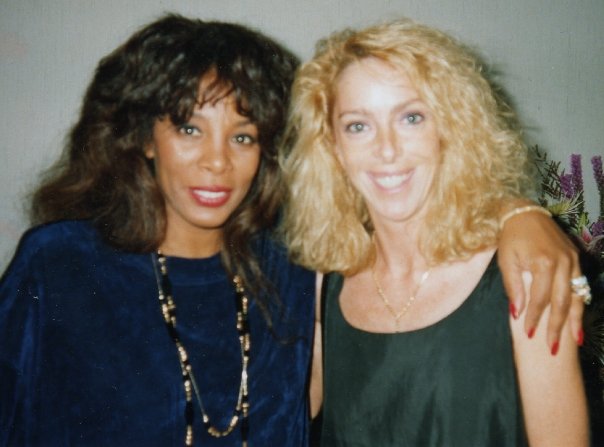
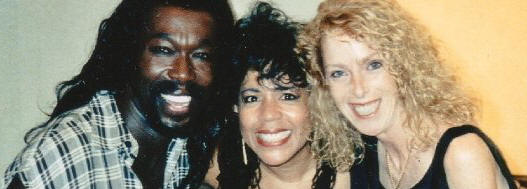
Kathy with Donna Summer, right;
with Nick Ashford and Valerie Simpson, left
I made the offer to Matt for full-time AM Drive and he declined, say he "was making more on unemployment."
I always regarded him as: "the one that got away". The experience would have been fabulous for him. I even tried squeezing barter or trade for him, from the book keeping department, but, alas, he again said no.
It's these very stations that are disappearing, from the broadcasting landscape, the local and live stations. The very stations most of we radio veterans received our training!
Maybe it was to be that fate would place Matt as Chief Of Airchecks! Without people like Matt, radio as it was in it's shining time, and perhaps even brighter in it's future wouldn't be documented via his mass and ongoing collection. He performs a public service! That in and of itself should be enough for acclaim!
Kathy Cunningham, former PD, WNYG-FM, Babylon, NY.
MS Yes, a year later, Cunningham calls me and says, “I found this tape. I want you to audition, live. When can you do it?” I say, “How about half an hour,” and was good to my word.
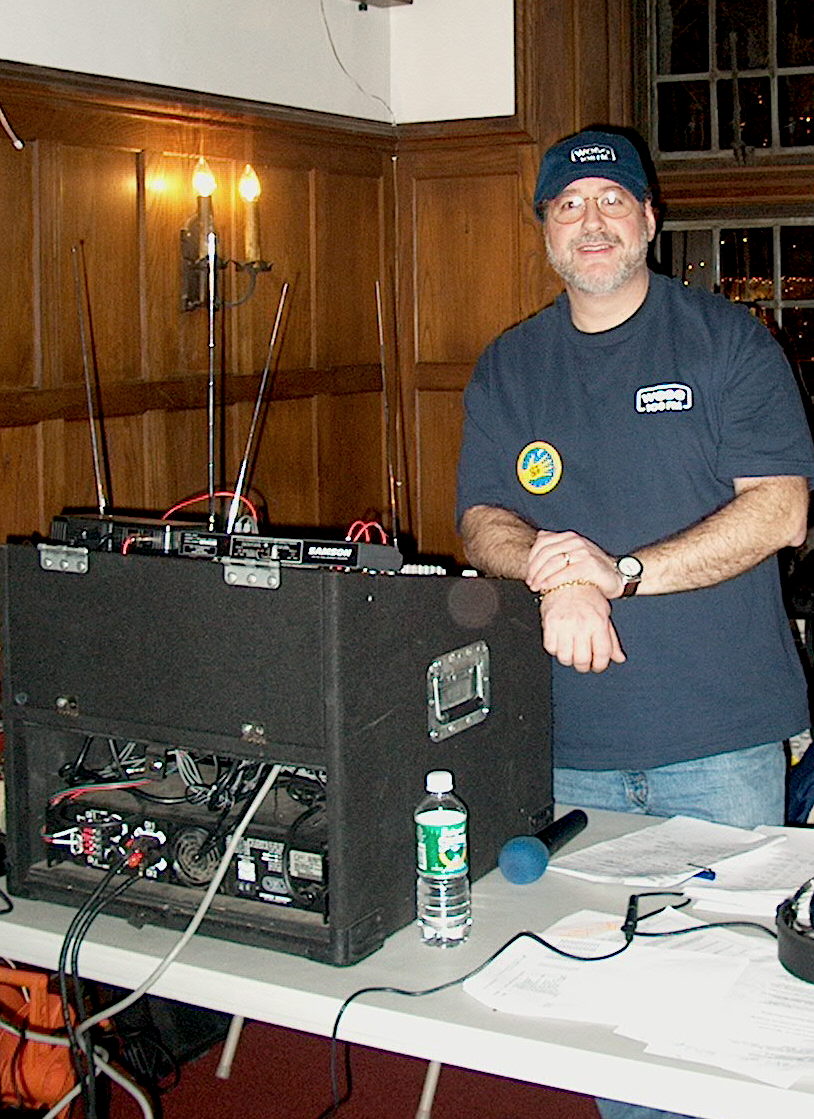


Matt at WEBE-FM
I was a little nervous, meeting Cunningham. She opened many doors for women in New York radio. In her mid-teens, she was the youngest DJ, on New York radio. Later, the first woman DJ on WLPR-AM, in New Haven, CN, and WLIR-FM, in Garden City, NJ. By the time I met Cunningham, she was a legend, in her own right.
After the live audition, at WNYG-AM, Cunningham gave me three fill-in shifts. As it turned out, I did the shifts, without pay. I had fun, though, and made three good air checks.
Cunningham offers me AM Drive, after my first fill-in shift. The job paid so little, I had to decline the offer. That’s why Cunningham says I’m “the one that got away,” from WNYG-AM, in Babylon, New York.
GS It’s interesting that Cunningham is not working in radio, today. The cutbacks, in radio, over the past decade or more, have been ruthless. I wonder where these niche workers go. What’s your take on jobs after radio?
MS Many DJs do commercials, narration and other voice work, as a sideline. Some DJs settle for a job in sales. They know the business, and feel comfortable.
When a DJ is out of regular, on-air work, the sideline is a financial bridge. If a DJ decides to leave radio, the sideline may become full-time. Either way, it’s often not enough.
GS I think Tim Byrd said he was putting together something along this line.
MS Many top DJs record ten radio spots, in one day, once a month, for ten thousand dollars. A great many invisible faces voice a huge range of videos, too, and earn top dollar. If a DJ has acting ability, especially if she or he speaks a second or third language, there’s dubbing and looping work aplenty.
If well known, a DJ has a better chance. If she or he does regular voice work, more work comes along, more easily. If someone doesn’t have studio access or a reputation, there’s next to no chance of getting voice work. A small pool, of women and men, do most voice work.
GS Paul Frees, when he was alive, dominated voice work. He was “The Man of a Thousand Voices.”
MS Yes and, maybe, Charlie Van Dyke holds that status now. If not a thousand voices, then used on ten thousand times. Gary Owens is in the same league.
GS Hard on those who don’t develop the sidelines, I imagine.
MS If a DJ doesn’t develop or have the interest or talent for a sideline, out of work often means tough times. Another on-air job is hard to find. Each year, it seems, the number of available DJ shifts shrinks.
Stations don’t replace retirees or DJs that move on. The trend, it seems, is to expand shifts, an hour or two, using existing on-air staff. Some stations sell emptied shifts to local advertisers, who fill it with one, long commercial.
GS I hear of many out of work DJs, who buy bulk time, from a station, sell the time, to local advertisers, and host the show. I think radio legend, Martin Block, of “Make Believe Ballroom,” did exactly this, in the 1930s.
MS I’m not sure about Block, but the idea, for a DJ to buy airtime he or she resells and hosts, isn’t new. As I mentioned, a moment ago, the typical direction is DJ to sales. Reselling and hosting time fits the trend.
Often, when a station releases a DJ, he or she goes, without work, for a long time. A friend, in Texarkana, Texas, lost his on-air job, a while back. The station gave him severance pay equal to his salary for nine months. He thought he’d get another job, right away, but didn’t.
My friend is a seasoned DJ. He has more than thirty years on-air experie nce, in many different formats and markets. A few offers came his way, but, for now, he settles for fill in work; he has no serious prospects for full-time on-air work.
There are hundreds of DJs facing the same wall. Work for minimum wage, take a second job or forget about on-air. This is part of the dire plight of radio, today.
GS What’s your take on radio, today?
MS Radio, today, is terrible. Barren, bland and boring is the best it gets. There are a few exceptions, mostly in major markets.
GS Who or what’s at fault?
MS Blame it on a corporate mind-set. Media barons know advertisers avoid controversy. Less said, on air, the less likely any controversy arises. From this idea flows one style: roll the music and spots.
Pepper the music and spots, with traffic, sports and financial updates. Safe and predictable syndicators provide the seasoning. The result is bland, but allegedly profitable.
GS You paint a sorry picture.
MS If all listeners want is music there are other sources. Satellite radio, if you can afford it, offers commercial free music. Many web radio stations are commercial free, too. Personal players, such as iPods, let you create your own playlists or randomly shuffle, which is appealing.
GS What is the draw to regular radio?
MS Not much draw, these days. AM is mostly news or talk, syndicated or local, focusing on politics or sports. For news-junkies, wanting news, all day and all night, AM is nirvana.
On FM radio, you find the same music on every station. This is especially true if you tune to stations owned by Clear Channel. Celebrity personalities, such as Ryan Seacrest, spend an hour or two recording “that was and this is” for the 1400 or so stations owned by Clear Channel.
FM, today, is not radio. Too often, stations use pre-recorded voices inserted into a rolling music and spots format. Computers play the right files, in the right order and at the right time.
When the voice, on the radio, doesn’t give a time or weather check, bet it’s pre-recorded. There’s much less use of pre-recorded voices in the largest markets, such as New York or Los Angeles. In smaller markets, where a live DJ adds most to the sense of community, finances force use of canned voices.
GS A few months ago, we heard from a station owner, in Nebraska. Bursting at the seams, with pride, he was ecstatic about how much money he made doing what you describe. He had no radio experience, having bought the station as an investment.
MS Clear Channel calls the celebrity voice service a “premium choice.” The keyword is “choice” and it’s a sham. In a recent news release, Clear Channel claimed local PDs had a choice, to use or not, the canned voices.
I hear from many PDs, working for Clear Channel, who say there is no choice. If they, the PDs, don’t use canned voices, they can’t meet the goals set by headquarters. Not meeting those goals means the same as find another job, and that’s no choice.
Canned voices also cause practical problems. Say a station doesn’t air Britney Spears, but the canned voice talks about her: what to do. Say a station does air Spears during the week, but the weekend voices talk about her: this is worst, of all.
Maybe Spears doesn’t fit the music image of the station. Does the station play her music and confuse listeners? Does a minimum wage, part-time employee spend hours editing her from the canned voices?
In the end, the station must change its music image to fit the canned content. Listeners wonder what station they have on, as all stations sound the same. Confused, listeners choose other sources for music.
GS Fewer and fewer live DJs means fewer and fewer personalities, to attract listeners.
MS Yes, a lack, of personalities, makes a big difference. When network radio fell to television, in the early 1950s, local personalities revived the medium. So far, a new saviour for radio hasn’t appeared.
Today, the only shows, which might display a little personality, are AM Drive and PM Drive. These time-slots remain the mother lode for radio sales. If a station invests in quality content, it’s for drive times: that’s where the audience and profits exist, today.
Outside major markets, such as Boston or Chicago, mid-days and evenings use canned content. In the majors, syndicated content, such as talk shows, may fill the off hours. No matter market size, overnights are most barren.
"It's interesting," says Chris Delgado, of Urban Latino Radio FM, "how Matt talks about what is lack on terrestrial radio. I started working Urban Latino FM, a streaming on-line station, because, for me, it tries to offer precisely what Matt says is otherwise lacking. Everyone, on Urban Latino FM, works to develop and maintain contact, with listeners. As operating costs, of Urban Latino FM, are low, we have no corporate suits watching over us. Web radio, I think, can do the job, if allowed."
Chris Delgado, Urban Life Radio
GS Overnights must hurt the most.
MS Once a special time, with a huge audience and profits, overnight radio now stagnates. Larry Glick, doing overnights, on WBZ-AM, in Boston, was a major profit centre. Today, Joey Reynolds is likely a solid money-maker, in overnights, on WOR-AM, partly because of those who listen to him via the web.
Typically, though, during overnights, from, say, midnight to 6 am, too many stations are on autopilot. A computer runs files containing music, voice tracking and spots. It’s common, for the overnight shift, to plug into a syndicated service and let it run, on its own.
Alison Steele, on WNEW-FM, ran a must-hear show, with a huge New York City audience. Larry Glick, on WBZ-AM, had millions of listeners, across the USA and Canada. Tonight, a computer will oversee the transmitter, in too many stations, as canned content airs from an empty building.
GS How do you think listeners react?
MS Listeners believe overnight radio boring. They play video games or watch old movies on television. Overnights, once, were a training shift, especially on small and medium market stations. Young DJs learned the trade doing overnights and weekends.
Call it the minor leagues. Call it the outfield. Call it whatever you want, but overnights and weekends is where talent developed.
This is where I got my training, on weekends. In 1978, I was an intern at WGLI-AM, in Babylon, New York. I wound carts and cleaned up, eventually doing weekend and fill shifts.
During the three years I spent at WGLI-AM, I learned something new every day. I loved every second of it. You know, today, the same route into radio doesn’t exist: there are no minor leagues for radio, any more.
GS Are there signs of hope for radio.
MS There are signs of hope, but not many. A few small AM stations exist and offer hope. KKNX-AM, an oldies format, in Eugene, Oregon, is one example. Still, most AM stations and a great many FM stations run fully automated, with computers, not DJs, in studios, delivering content to listeners via the transmitter.
GS How do you sum up the state of radio, today?
MS There’s a sense, but no feel, of radio, today. A minimum wage employee, who may or may not have an interest in radio, keeps an eye on what listeners hear. When a DJ can answer the phone, talk with his or her listeners and play music, as a response to that chat, a sense and a feel of radio exist; the audience, DJ and station are at one.
GS That last comment is much Alison Steele, Rosko and Dick Summer. It shows they were right. What are your thoughts on satellite radio?
MS I don’t think satellite radio can last. It’s starting to sound as humdrum as commercial radio. Who’s going to pay twelve dollars month for what’s otherwise free?
Satellite radio doesn’t have the depth, of music, it once did. The music narrows to cut costs. When you cut DJs, you cut music.
Sirius and XM cut many DJs, before the merger, in July 2008. After the merger, Sirius XM cut more DJs. Those shows and that music no longer exist.
Pre-recorded shows were common on Sirius. At some point, though, a DJ was in a studio, doing a show, which aired later. There’s a huge difference between recorded for later use and canned voices. The result, of Dick Summer, say, doing his show live to tape, as he would live to air, is a world away from someone, sitting in a Los Angeles studio, repeating a few lines.
GS Maybe you can take us through a problem or two, with canned voices.
MS There are three basic lines for canned voices. “I’m Ryan Seacrest, on [insert station name], in [insert city]. That was [insert singer or band name]. This is [insert singer or band name].”
What the listener hears is, “I’m Ryan Seacrest, on WNBX-AM, in Muscle Shoals, Alabama. That was Britney Spears and this is REM.”
Record the clip once. Copy it into future digital files. The same voice tracking pops up on two thousand stations.
After the merger, of the Sirius and XM services, satellite radio rolled music, with little interruption. Other than speciality shows, such as Bob Dylan, which are usually weekly, Sirius XM is background music. If all a listener wants is continuous music, in the background, satellite radio is good.
GS I think we can guess what you believe Sirius XM needs.
MS Sirius XM needs more content, personalities selling the music, if it’s to survive as an effective medium. I firmly believe it needs personality. Until that personality happens, radio, of all types, remains stagnant.
Let me tell you about a DJ, Terry Young, on Sirius XM. He has 30-plus years of radio experience, mostly major markets. Before the merger, of Sirius and XM, Young was on XM Channel 6, doing "Sonic Sound Salutes," audio tributes to Top 40 radio stations, of the 1960s.
After the merger, Mel Karmazin is listening to Young doing a tribute to WGH-AM, a smaller station serving Norfolk, Newport News and Portsmouth, Virginia. Karmazin doesn’t understand and only hears one show. If he’d listened a week earlier, he would have heard a tribute to WABC-AM, in New York City.
Thoughtlessly, Sirius XM quickly moves Young to a less listened to time slot. Not long afterwards, Sirius XM dropped the show. Karmazin is a sales person, not a programmer, and this is the scourge of Sirius XM and all radio.
GS Interesting you mention how Sirius XM needs to develop personalities. Rumours are everywhere that Howard Stern, for whatever anyone thinks, is its premier personality, but he wants back on regular, terrestrial radio. Where do you place the blame for the state of radio, today?
MS There are too many “idiot consultants,” paid much for advice, of little worth. A generation ago, before the radio meltdown, consultants, such as Paul Drew, Buzz Bennett, Mike Joseph and Bill Drake, earned clients a hundred times their fees. Today, consultants give every client the same advice: cut DJs, use canned content, push your sales team harder.
A generation ago, Bob Pittman, on his own, turned WNBC-AM, in New York City, into a top competitor. Pittman managed a hundred women and men, doing thirty different jobs. Today, a PD, at worst, oversees one or two people and claims no time for creativity.
GS It’s true. Mel Karmazin, the great leveller of radio, recently let Liberty Media buy 40% of Sirius XM, do you see that as a sign of new hope?
MS Corporate radio is barren, bland and boring, and that’s that. Radio is a calling, not unlike the ministry. Radio is creative expression. Radio is not widgets, uniform in size, shape and cost.
A large part, of the problem, is the constant cost cutting. The bean counters put out ridiculous budgets, which no one can meet. The first item they cut is on-air talent.
Cut back on talent, all the time, and the quality, of radio, has to suffer. The bean counters are killing radio, as is Wall Street, which is always looking for more profit. Even as Wall Street imploded, like Nero watching Rome burn, radio stocks tumbled so far down as to be worth barely anything.
GS Radio suffered a version, of the leveraged buy-out, perfected by Henry Kravis, of KKR, in New York City. Take over a company. Sell its assets as you can. Cut costs to the bare minimum. Sell the company as an efficient operation. Just, today, I heard, on the radio, that Clear Channel was considering selling its radio stations.
MS You can’t successfully take this approach when creative women and men are involved. Not everyone is creative. Nor are the creative, among us, equally talented. The point is that a well-intentioned accountant, who enjoys radio, can’t build or manage a great or good radio station.
Large-scale corporate ownership, of radio, killed the medium. The first step, to reinventing radio, is revising the current ownership. Small-scale ownership, say ten or twelve stations, in different markets, is all right, but the Federal Communications Commission (FCC) must scale back huge companies, such as Clear Channel, CBS Radio and others.
GS Seems only those who oversee the decline of radio, today, make any money, in radio. I’m thinking of Karmazin or John Hogan, at Clear Channel.
MS Right! Those, at the top, make the money and run. Workers fend for themselves.
GS To shift gears, again, Dick Summer is one of your favourites.
MS Dick Summer is a legend. Again, I talk to Dick, on the phone, but have not met him in person. I first talked, with Dick, when I was organizing the WNBC-AM and WYNY-FM reunion. I was hoping he would come, but he couldn’t.
I did ask Dick to record an introduction for Big Apple Air Checks. He did. It’s great, runs chills up and down my spine every time I hear it. Imagine, Dick Summer on my site.
GS Know exactly what you mean.
MS I decided to produce a Dick Summer: this is your radio life, a tribute to a living legend.
GS What did Dick think? He has a Gary Cooper, awe shucks side.
MS He didn’t know. During production, it was all hush-hush. Dick Summer air checks are everywhere. What not to use was the hard decision. Still, the best part is he had no idea.
GS Robin Marshall, one of your radio sisters, had a special part in the Dick Summer Special, I think.
MS She ends the special, with a bit that she recorded, with Dick. It blew me away. I had no idea she knew Dick. Neither, of us, told Dick I had this clip.
When Dick listened, to the special, he almost fell off his chair, at the end. “Matt,” he says, “I’m going to make copies for every member of my family so they’ll remember what I was all about.” That to me is such a compliment.
GS I noticed you have a Tribute section on the Big Apple Air Check web site.
MS That’s a personal page. It started as a fluke, when Chuck Leonard passed away, on 12 August 2004. I had met Chuck, once, at an event sponsored by the Music of Television and Radio. The event honoured Scott Muni, and Leonard had a role in the homage.
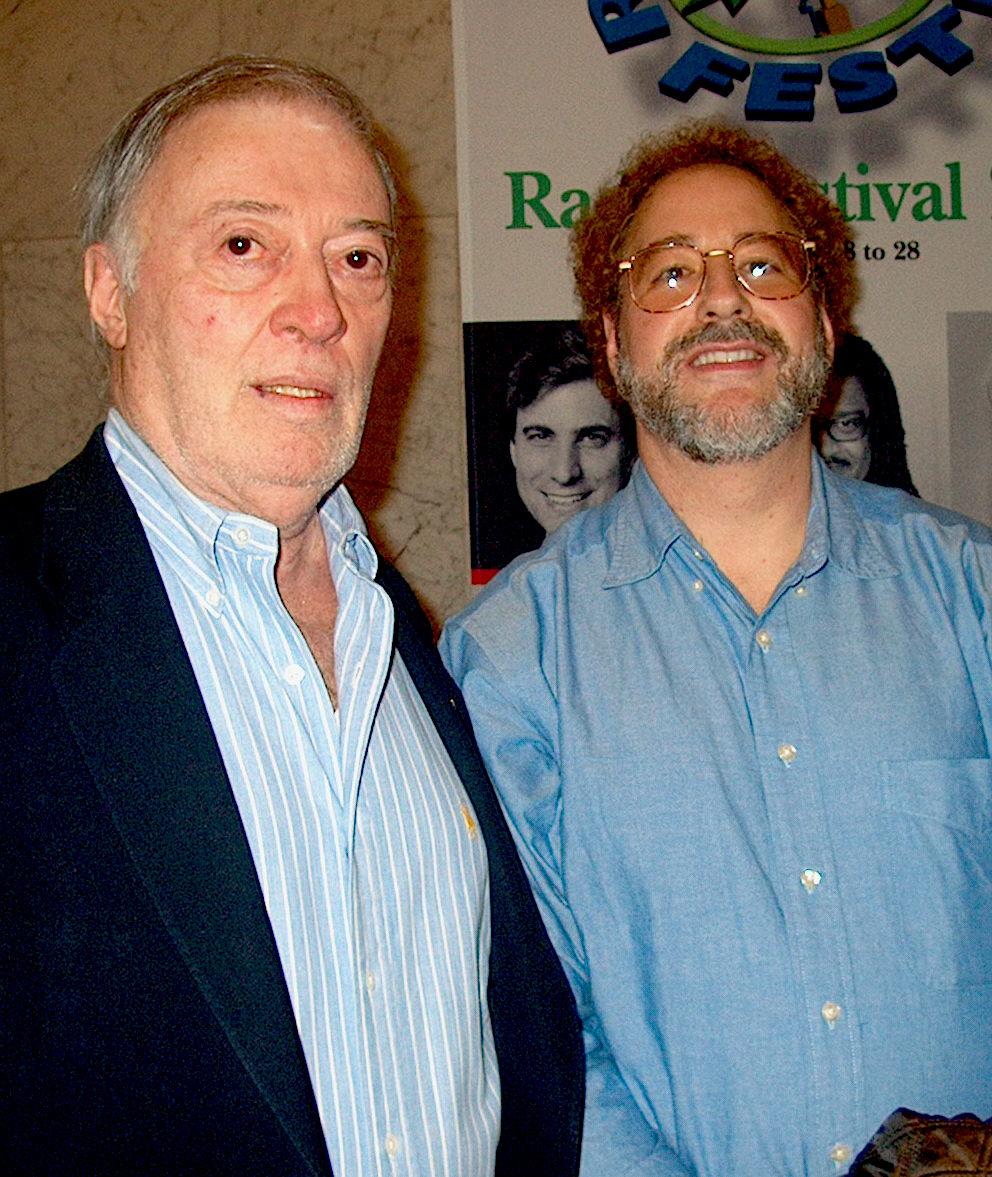
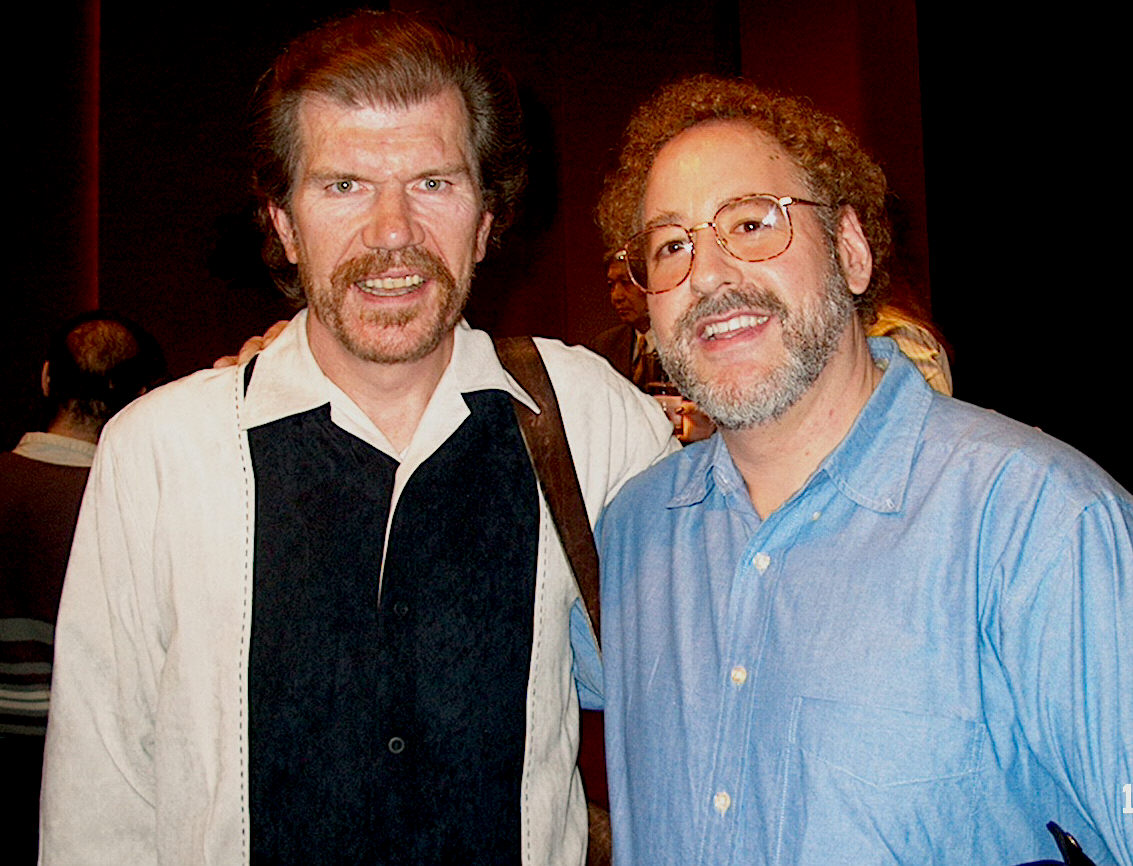
Matt, left, with Scott Muni, and Pat St. John, right
As a child, I kept the radio underneath my pillow, late at night, to listen to Leonard, say, on WABC-AM. He meant much to me. It was a thrill to meet Chuck Leonard, after listening to him for years, on New York City radio.
When Leonard passed away, I thought I had to do something, to honour his memory. I produced a Big Apple Air Check Tribute. Pat St. John voiced the opening, of the one-hour tribute. Jonathan Wolford, of jingle fame, did a montage, of spots and promos voiced by Leonard.
I'm always flattered when Matt adds recordings of my on-air work to his collection. I rarely record any of my shows, but Matt has heard and collected some of my best. He does all this collecting and cataloging, with such passion, he makes it an art form. Thanks Matt, for preserving the glorious sound of radio. You're an important part of the business, and though we don't often tell you, we really appreciate all you do!
Pat St. John, Sirius XM and WCBS-FM
The second Tribute, for Scott Muni, was closer to the heart. I met Muni, of WNEW-FM, in 1978. Pat St. John, again, introduced the tribute, which runs about eighty minutes. St. John worked with Muni at WNEW-FM.
The next tribute was Ted Brown, who passed in 2005. I didn’t know and never met Ted. I never listened to Ted. I wasn’t a fan of Ted Brown. There were people who loved him.
Brown was a prisoner, in Germany, during World War II. He was a tail-gunner, on a B-17. The B-17 went down, during a raid, and he became a prisoner of war, an American hero.
After the war, Brown worked at WMGM-AM, WNEW-AM and WNBC-AM, among other stations, in New York City. Big Band music, in the heyday of AM radio, in New York City, was his specialty.
Brown was important among war veterans. The pile of material, from and about Brown, was unbelievable. Collecting his radio swag was easy.
Andy Fisher, who worked, with Brown, at WNEW-AM introduced the tribute. A pile of people voiced comments. The tribute, to Brown, turned out well, I think.
GS Johnny Dark, the well-known DJ, had notable influence on you.
MS Johnny Dark came to work WNBC-AM, New York, from WRKO-AM, in Boston. That was 1977. Dark has a storied career. He worked WOKY-AM, in Milwaukee, Wisconsin and WFLC-FM, “Coast 97,” in Miami, Florida. In his heyday, he was number one, in his time-slot, for twelve years straight and at different stations. Today, he’s retired, in Florida.
The night before the “All New WNBC” launched, Dark did a show as, “Dennis the Menace.” It was hilarious! He was the loud, obnoxious Top 40 DJ, of the 1960s, the opposite of what WNBC-AM would be. To this day, it’s one of my favourite air checks.
GS Tim “Byrdman” Byrd is a huge fan of Big Apple Air checks.
MS Yes, a wonderful friend and a great DJ. He worked WQHT-FM, in New York City, as well as WNBC-AM and WPIX-FM. He was at WGCL-FM, in Cleveland, with Sue O’Neal. Tim was among the first crop of VH-1 DJs, too.
I met Tim, in Florida, about seven years ago. He came to Fort Lauderdale, where I was visiting, with his fianc�, Sally. What I didn’t know, at the time, was it was their first date; they had met, at an event, two days before.
As they were leaving, I said, “Invite me to the wedding.” Sally and Tim looked at each other. What did I know they didn’t? It was obvious. Now they’re married about six years.
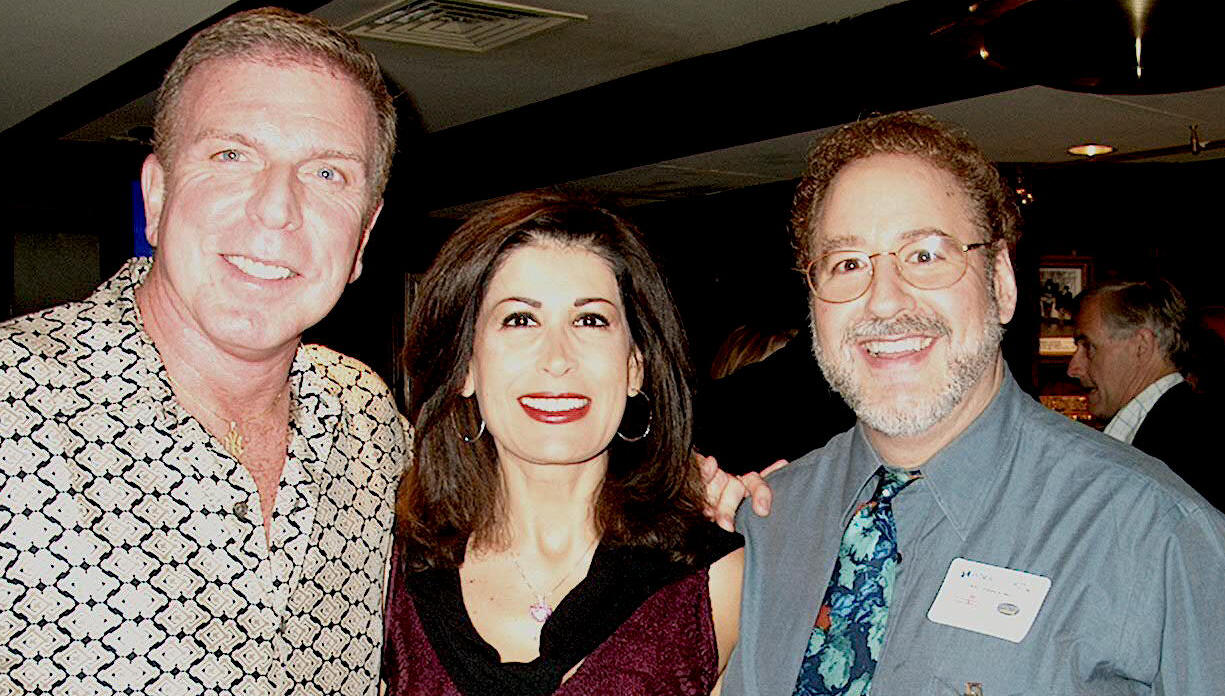
Tim Byrd, his wife, Sally, and Matt
Eventually, Tim allowed me into his purple studio. This is a rare compliment. The studio is a mix of old and new technology. Tim had rack built for vinyl and cds: it’s an impression experience, his studio. Despite my awe, we found many great Byrdman tapes, hiding in nooks and crannies.
Tim made a point of coming to the WNBC-AM and WYNY-FM reunion I organized, in 2004. Another radio legend, Joey Reynolds, also came by, as did Batt Johnson.
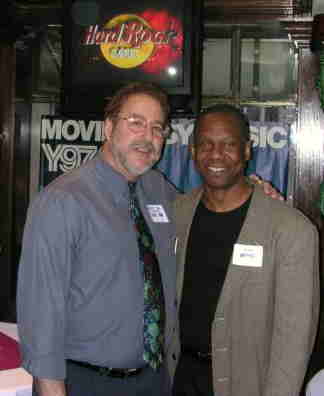
Matt and Batt Johnson at WNBC-AM/WYNY-FM Reunion
GS How did that reunion come about?
MS I’m always phoning or e-mailing DJs or news people who worked different New York City stations, including WNBC-AM or WYNY-FM. Usually, I want an air check. Everyone eventually finds something or another I can use, if only to get rid of me.
In early 2003, I tracked down Allan Beebe. I hadn’t heard from him, in a while, at least 15 years. Finally, I found him in College Station, Texas, of all places.
As we talked, catching up, we realized it was about 30 years since he arrived, in New York City, to work WNBC-AM. “Wolfman Jack” worked that station, about the same time, as did Joey Reynolds, Dick Summers, Don Imus and others.
I began testing the idea, for a reunion, among my regular contacts, such as Herb Barry and Mitch Lebe. Both Barry and Levy had worked WNBC-AM or WYNY-FM. Word got around, about the reunion idea, and the response was positive.
It took about year to put the reunion together. We settled on the Hard Rock Caf�, on 57th Street, in New York, as the best location for everyone. Picking a date was a poor decision.
Dale Parsons, a PD at WNBC-AM, said he was visiting New York, from Hawaii, in June 2004. Sunday, the 20th, he suggested, was best for him. Months in advance, no one checked the date, closely: it was Father’s Day.
The reunion was a success, with women and men from sales, copy, news, engineering as well as DJs and a few fans. Many DJs missed because of Father’s Day. Parsons didn’t make it. Dick Summer, father of six, who lives near Philadelphia, couldn’t attend, but sent regrets.
Pete Salant and Herb Barry attended. Salant, once PD, of WYNY-FM, had fired Barry. DJs have long memories, but they were friends, again, after the reunion.
GS The reunion is a good example of how life happens.
MS At the reunion, I met Pete Salant, for the first time. We talked and talked. Salant was working WEBE-FM, in Bridgeport, Connecticut; he wondered if I’d consider doing “Studio 108,” a Saturday night speciality show.
A week or so later, Danny Lyons, the Music Director (MD) and midday DJ, at WEBE-FM, called me. Would I come, to the station, on a Saturday night, to do some on-air work, for fun? I’d take over the final three hours, of “Studio 108.” Kevin Quinn, the regular host, would help me as needed.
I did fill, for “Studio 108, a few times as “Magic Matt” Craig. Craig is my middle name. There were few limits, on the show. Talk about every second record, maybe, and that was it.
The fill work led to a New Year’s Eve live remote, in Westport, CN. The event, called “First Night,” focuses on getting families into town centre, at night. I did live, person in the street, segments, as did Steve Allen, fifty years ago. I stopped women and men. I asked questions, in hopes of finding good spirit and humour.
A woman asked me, “Why are you called ‘Magic Matt’?”
I say, “See that plate of cookies, over there.”
She says, “Yes.”
I say, “I’m ‘Magic Matt’ because I can make a plate of cookies disappear.”
GS We’ll watch our cookies, carefully, around you. Thanks, Matt. We're giving Tim Byrd, the last word: “I’m certainly glad someone cares enough, about radio, to showcase it's history: where radio came from, where radio went and what radio is today.”
-----
Click, below, to listen to a radio compliation from Big Apple Air Checks. Volume may vary from computer to computer. You may need to adjust the sound level.
Click here to go to Big Apple Air Checks.
Click here for a list of all Grub Street Interviews.
Interview edited and condensed for publication.
Rich Knight teaches English, in Dover, NJ.
Click above to tell a friend about this article.
Recommended
- David Simmonds
- Net Negative
- A Dubious Legacy
- Ginormous

- Sjef Frenken
- Fat Chance
- Jack the Misanthrope
- A Nude and a Spot

- Jennifer Flaten
- Uncelebration
- School's Back
- De-christmasing

- M Alan Roberts
- What the USA Needs
- Dead Spots
- Gasping for Air

Recommended
- Matt Seinberg
- Spam
- Twinkie Liquidation
- Sessions vs the Opioid

- Bob Stark
- NHL Start 2016
- $99 to Use the John
- The BumbleBee

- Streeter Click
- Grub Street Philosophy: 1
- Mission
- Richard Kramer

- JR Hafer
- Piet Soer
- Scott Muni
- Alison Steele

Recommended
- AJ Robinson
- Act One
- Once I was Audrey
- The Feel of a Book

- Jane Doe
- Pink Friday
- Recovery
- Ted 2

- M Adam Roberts
- Is She the One?
- Thanks a Million
- Learning to Fly

- Ricardo Teixeira
- There is a Light
- Harmony
- The Future


